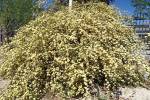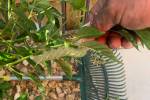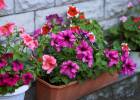Get cool-season veggies into the ground now
It’s time to plant your cool- season vegetables. Note what you can plant: beets, broccoli, cabbage, carrots, cauliflower, chard, endive, kale, lettuce, onions, parsley, peas, radishes and spinach. These vegetables love our spring weather, but get them in before April Fools’ Day to get the best results.
I asked Master Gardener Don Fabbi what steps gardeners can follow to be successful. He said, “Take advantage of our weather, improve your soil, plant the vegetables right, mulch the vegetables after planting and visit your garden daily.”
But first Fabbi wants to mention other reasons for planting veggies:
■ You have complete control of your garden.
■ You are able to expand your plant palette by ordering from different catalogs.
■ You know your food is safe.
■ You harvest vegetables at the peak of freshness.
■ Gardening brings families together.
■ It brings you a great sense of accomplishment.
Weather advantage: Planting vegetables at the right time is so critical. Fabbi said, “We have three planting seasons in Las Vegas. The first is planting cool-season vegetables in February and March. The second is planting warm-season vegetables (tomatoes, peppers, melons, squash, to mention a few) from March into June. And then planting cool-season vegetables again from August into October. These crops will overlap so you’ll have a thriving garden all year.”
Soils: Fabbi said, “Our native soils are almost dead because they don’t have any organic matter in them.” Fabbi’s favorite saying is, “If you only had $100 to spend on your garden, spend $90 on the soil.” That is just how strong he feels, and he focuses on soils in all his lectures.
If you plan to grow your garden in our native soils, here’s Fabbi’s prescription for success.
■ Remove all junk and large rocks in the garden area.
■ Apply compost over the garden area up to 8 inches deep.
■ Add a balanced fertilizer of nitrogen, phosphorous and potassium. Nitrogen causes plants to grow; phosphorous spurs the production of roots, flowers and fruit; and potassium improves the overall health of your veggies.
■ Work these ingredients at least 6 inches into the soil.
■ Give your soil a good soaking to flush away the salts and alkali.
■ Once the soil becomes workable, plant.
You inherit a lot of problems when growing vegetables in native soils. Fabbi finds raised beds are problem solvers. You want the bed to be at least a foot deep if you’re going to plant foot-long carrots.
Place 2-by-12-inch boards around the area you want to grow your crops in to contain the soil. Fabbi adds another board so he can sit while working his garden. Only make your beds 4 feet wide so you can reach across the beds to work them. You don’t have to walk on the soil. Then fill the bed with compost soil. There are two places Fabbi purchases his composted soil: Viragrow (702-497-7371) or Whiting Brothers (702-457-4066). They sell composted soil in bulk and deliver for a slight charge. These soils cover a multitude of sins to make your gardening much easier.
Planting: Most cool-season vegetable seeds are planted directly into the soil. Here is a well-kept secret of Fabbi’s: All the information you need to know is on the seed packet with three exceptions:
■ Determine the average last frost date, which is mid-March. The packet will tell you to plant these vegetables four to six weeks before the last frost date.
■ The packet will also tell you to plant in full sun but you need to provide some shade under our conditions. It’s always best to plant on the morning sun side of the house to protect your vegetables from afternoon sun.
■ Finally, examine the picture on the packet. That picture tells you what the vegetable looks like at peak quality.
Mulching: Mulching is critical. It conserves moisture, cools the soil and becomes a haven for microorganisms to improve your soil even more. Spread the mulch on your garden about 3 inches deep.
Visit your garden: Fabbi concluded by saying: “I visit my garden early every morning. With these visits I conquer just about every problem that may happen. If I see webbing building up, I hose the garden down. I seldom resort to using pesticides.”
By following these steps, Fabbi predicts you will have a highly productive garden.
Linn Mills writes a garden column each Sunday. You can reach him at linnmillslv@gmail.com or call him at 702-526-1495.























